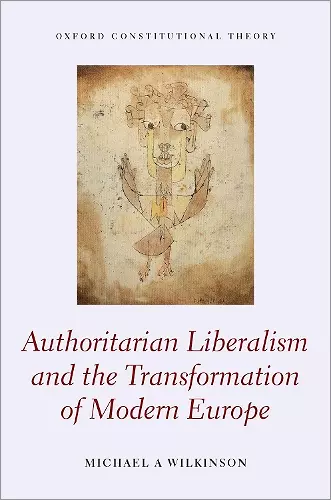Authoritarian Liberalism and the Transformation of Modern Europe
Format:Hardback
Publisher:Oxford University Press
Published:10th Jun '21
Currently unavailable, and unfortunately no date known when it will be back

This title recounts the transformation of Europe from the post-war era until the Euro-crisis, using the tools of constitutional analysis and critical theory. The central claim is twofold: Europe has been gradually reconstituted in a manner that combines political authoritarianism with economic liberalism and that this order is now in a critical condition. Authoritarian liberalism is constructed supranationally, through a taming of inter-state relations in the project of European integration; at the domestic level, through the depoliticization of state-society relations; and socially, through the emergence of a new constitutional imaginary based on liberal individualism. In the language of constitutional theory, this transformation can be captured by the substitution of supranationalism for internationalism, technocracy for democracy, and economic for political freedom. Sovereignty is restrained, democracy curtailed, and class struggle repressed. This constitutional trajectory takes time to unfold and develop and it presents continuities and discontinuities. On the one hand, authoritarian liberalism is deepened by the neoliberalism of the Maastricht era and the creation of Economic and Monetary Union. On the other hand, counter-movements then also begin to emerge, geopolitically, in the return of the German question, domestically, in the challenges to the EU presented by constitutional courts, and informally, in the rise of anti-systemic political parties and movements. Sovereignty, democracy, and political freedom resurface, but are then more actively suppressed through the harsher authoritarian liberalism of the Euro-crisis phase. This leads now to an impasse. Anti-systemic politics return but remain uneasily within the EU, suggesting authoritarian liberalism has reached its limits if just about managing to maintain constitutional order. As yet, there has been no definitive rupture, with the possible exception of Brexit.
There has been much criticism of the EU's response to the euro crisis and the flawed architecture of the single currency itself. But Wilkinson demonstrates how the foundations for these problems were laid in the depoliticization that took place in the immediate postwar period, and have even deeper roots in the 'constitutional imagination' of the interwar period. * Hans Kundnani, Chatham House, UK, International Affairs *
Wilkinson's revisionist history of European integration challenges our understanding of the origins of the current problems in the EU and shows how deep the problems with the EU from a democratic perspective go. * Hans Kundnani, International Affairs *
In his fascinating and provocative new book, Michael Wilkinson invites us to reconsider the history of the European Union (EU) as having been shaped, from the very outset, by a fear of democracy that was shaped by the experience, in the interwar period, of democracy threatening to 'unleash itself'. * Ruth Dukes, European Law Open *
Authoritarian Liberalism offers a remarkable analysis of the factors that caused a rejection of social and political conflict from European integration and, while doing so, it also reconstructs a century of European constitutional history. * Marco Goldoni, European Law Open *
Authoritarian Liberalism is an important, and, in many respects, praiseworthy contribution to the debates on the present state of the European Union (EU) and its highly problematical future. Its recourse to political economy in the reconstruction of the integration project contrasts innovatively and instructively with the usual, if subtle, stories told about the history of Europe's 'integration through law' and the promotion of an 'ever closer union among the peoples of Europe'. The spectre of 'authoritarian liberalism' is a counter-narrative which exhibits the socio-economic dimensions of the integration project and forces us to consider the political quality of European rule. * Christian Joerges, European Law Open *
Michael A. Wilkinson has produced one of the most thought-provoking books ever written on the European Union by making a compelling case that the organisation is fundamentally driven by its commitment to, and protection of, economic liberalism ... He is at the forefront of the burgeoning movement of scholars who are turning the lens on the European Union as the creator of its own malaise. * Hilary Hogan, European Constitutional Law Review *
This book presents the first deeply constitutionally and historically grounded monograph-length argument identifying the features of the EU that make it undemocratic. * Oliver Garner and Michal Matlak, Review of Democracy *
This book characterizes the EU in more than one way... Wilkinson's aim is to "open the space to develop critical theories of European integration, not as some form of external constraint, or experiment gone awry" but as a project destined to become what the title of the book claims it is. * David Hollanders, University of Amsterdam *
ISBN: 9780198854753
Dimensions: 240mm x 160mm x 24mm
Weight: 656g
352 pages